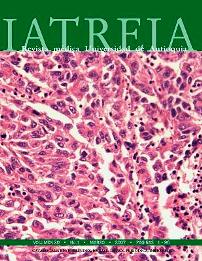Self-knowledge, control and complications of diabetes at no more blind by diabetes session in Antioquia, 2005
DOI:
https://doi.org/10.17533/udea.iatreia.4380Keywords:
Blood glucose, Diabetes mellitus, Glycosylated hemoglobin, Self-monitoringAbstract
INTRODUCTION: A better knowledge about diabetes by patients has been associated with better understanding of the disease, self esteem and improved clinical care and metabolic control.
MATERIAL AND METHODS: It is a cohort study, made during the “No more blind by Diabetes” session, 2005. The study population fills out the form with questions about the blood glucose control, type of diabetes and treatment. Also a measure of blood glucose, height, weight, and abdominal circumference was made.
RESULTS: 210 patients were included, 36.6% did not know which type of diabetes they have, 59.7% did not know what glycosylated hemoglobin is, 25.8% know that the frequency to evaluated this test is about 3 o 4 months, but only 3.3% had the recommended frequency. The 36.4% has glucose monitors and 60.6% know that the frequency of eye examination should be annual.
In type 2 diabetic patients, only 26.2% had glucose test in the ideal range for postprandial glucose (less than 140 mg/dl).
Kidney disease and acute hyperglycemic crises with impaired mental status were the most frequently complications reported by patients with type 1 diabetes, meanwhile neuropathy and lipid problems were the most frequently complications reported by patients with type 2 diabetes.
Downloads
Downloads
Published
How to Cite
Issue
Section
License
Papers published in the journal are available for use under the Creative Commons license, specifically Attribution-NonCommercial-ShareAlike 4.0 International.
The papers must be unpublished and sent exclusively to the Journal Iatreia; the author uploading the contribution is required to submit two fully completed formats: article submission and authorship responsibility.














